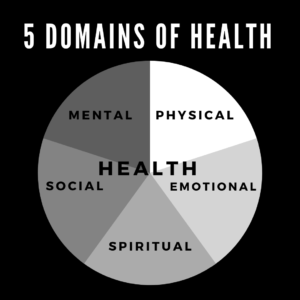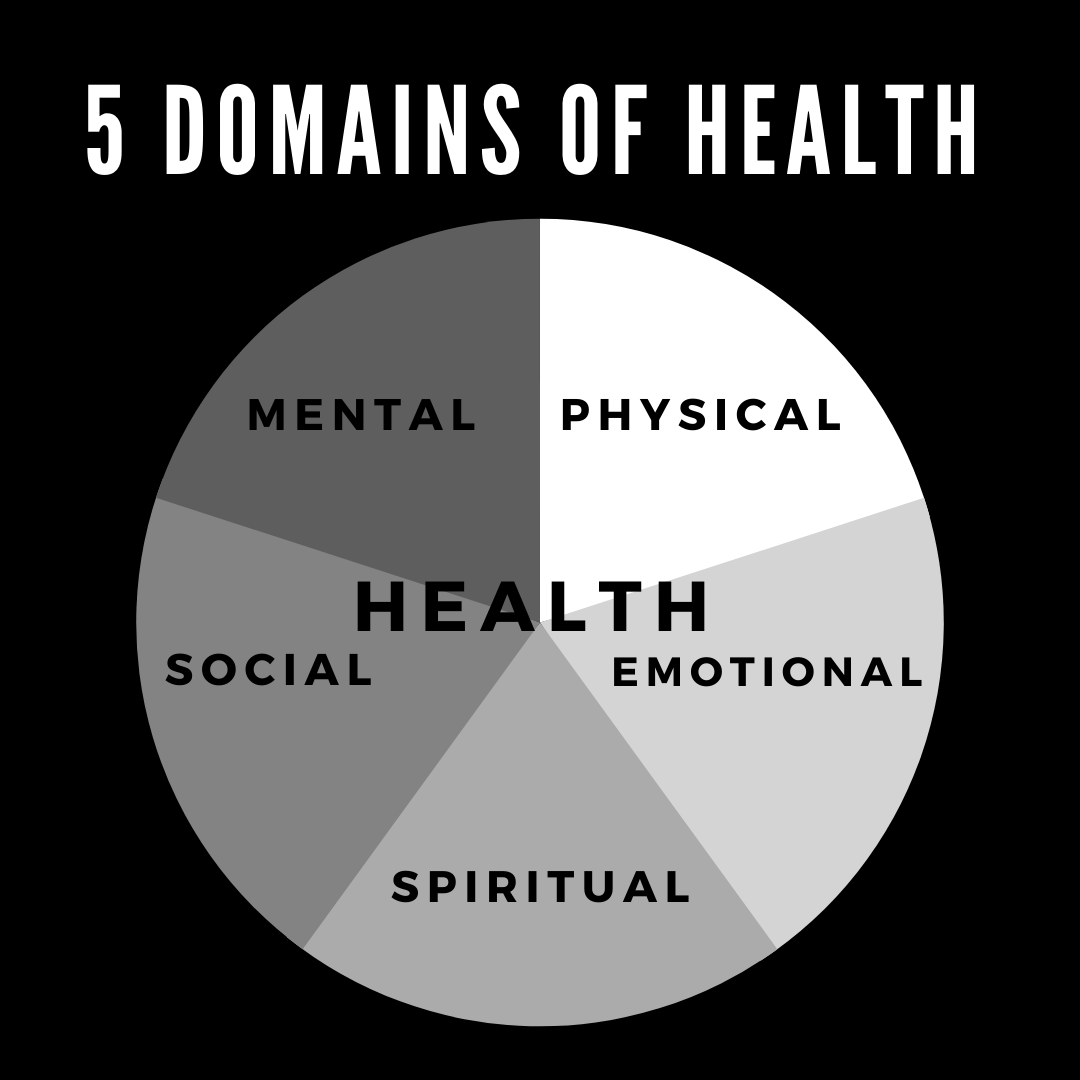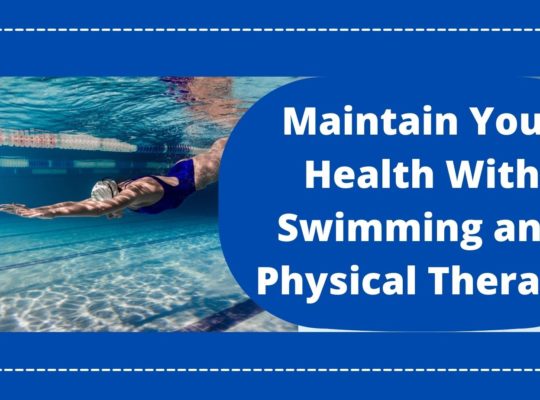In order to determine how you start living a healthy lifestyle, we must first ask ourselves what it means to be healthy.
There are many models of wellness and health, but we will keep it simple and talk about the 5 areas you need to consider in order to achieve true wellness.

These are:
Physical Emotional Spiritual Social Mental
These areas all come together to contribute to your overall health or wellness. If there are problems in one area, it can lead to difficulties in all of the other ones as well. This is why in order to live a truly healthy lifestyle, you must address each area fully through changing your mindset and behaviors.
A good trick is to start by rating yourself 0-10 in each of these health domains.
Chances are if you’re reading this article, you will have areas that are below a 10, so the next step is to ask yourself,
“What do I need to do in this particular area to increase my number closer to 10?”
Then, check the guide below and choose actionable steps from each of the domains that you can commit to taking in order to increase your score in that area.
We recommend focusing on one domain at a time and choosing no more than 1-2 behaviors to try to change at once. This will keep you from becoming overwhelmed and make you more likely to succeed in your quest to live a healthier lifestyle.
Physical:
Physical health relates specifically to the health and physical functioning of your body. This includes all of the biological processes that need to occur for your survival. This can also include having the ability to do all of the things you want to do, completing daily tasks, and living comfortably in your body.
To maintain physical health, it is important to have the energy to complete all work and play tasks. The best way to accomplish this is to make sure that you eat a balanced diet to fuel your body, sleep 7-8 hours per night, and then get the recommended amount of exercise per week (150 minutes of moderate exercise). This will keep all of the body systems functioning as best as possible and help you to ward off preventable diseases like heart disease, type 2 diabetes, and high blood pressure.
Emotional:
Emotional health is characterized by your ability to recognize, express, and resolve emotions from your learned experiences. It also includes your overall emotional state. This can be influenced by your self-esteem, confidence, and your beliefs about yourself, others, and your relationship to the world.
To maintain emotional health, you should examine your beliefs or thoughts that lead to feeling certain emotions, and determine if they are aiding you or hurting you in meeting your goals.
Spiritual:
Spiritual health has to do with understanding your purpose in life. Many find this from a faith or religious practice. Some people make their own purpose. Whatever your choice, having a strong sense of purpose helps you to be motivated to achieve your goals, face setbacks, and contribute positively to the world.
To maintain spiritual health, define and become connected to your purpose in life. The motivation and fulfillment experienced will drive you toward achieving total wellness and impact all other areas of your health.
Social:
Social heath relates to our ability to connect with others–initiating and maintaining meaningful relationships. This includes picking up on social cues, caring for and nurturing another person, and maintaining acceptable social standards.
To maintain social health, meet regularly with close friends and family to continue to develop deeper connections, learn about setting and enforcing boundaries, and express empathy for others.
Mental:
Mental health is an area that is being focused on more because mental health deals with cognitions, or your thoughts themselves. It is your ability to use your brain and think. The thoughts we have often drive the emotions that we experience, so mental and emotional health are highly related but not the same thing. Mental health problems can certainly include the cognitive parts of anxiety and depression, but they can also be Alzheimer’s or dementia.
To maintain mental health, physical activity and diet are also very important. Physical activity increases blood flow to the brain so that it has increased oxygen to improve function. Also, a balanced diet decreases oxidative stress, which is damaging to the brain.
With all that we discussed above, let’s help you dive a little deeper to make transitions in your life in each of the health domains, leading to a much healthier you. We want to open your eyes to possible behaviors to change in each of the domains to impact your score.
Let’s Begin, one action at a time:
Behaviors to Implement (Remember, choose 1-2 behaviors from 1 domain at a time!! )
Physical:
Get a good night’s rest.
Sleep can affect how you interact with your day so you definitely want to feel rested. Well-rested people not only cope better with stress, but may also have better control of their appetites and how they respond to situations. Research has shown that a lack of sleep can put our “hunger hormones” out of balance — and possibly trigger overeating when you do get hungry again. BAD BAD BAD.. food is good but overeating is not the way to go. Have you ever run into someone who has a short fuse because they didn’t have a goodnight sleep? We have. It’s not pretty.
Get a pedometer and let it motivate you to walk.
Walking is a great form of exercise. Forget about how many minutes of activity you need; just do everything you can to fit more steps into your day. No matter how you get it, physical activity can help defuse stress, burn calories, and boost self-esteem. The National Heart association says 10,000 steps is the goal.
Try yoga and Keep Moving.
Yoga poses help increase strength and flexibility and improve your balance. As we age we tend to lose our flexibility and balance so these are critical areas for older folks especially, and both men and women can benefit. Your body is meant to move and not be sedentary. So after you read this, get moving. Or even walk and read, just don’t run into a wall.
Power up the protein.
Protein can make up anywhere from 10%-35% of your total calories needed for the day and this is huge for your body to work properly. Protein lasts a long time in your belly; combine it with high-fiber foods and you’ll feel full on fewer calories. Enjoying small portions of nuts, low-fat dairy, beans, lean meat, poultry, or fish is a good way to start.
Drink Lots of Water. H20.
When you get up in the morning, start with a big 8 oz of water. You lose water when you sleep and depending on if you are a person who pees a lot during the night you won’t replace it during the sleep hours. When you get up, get that water into your system. As you continue your day, continue to drink water to stay hydrated. This allows your brain and body to function to its fullest and not feel drained when doing heavy work. Staying hydrated is also good for your joints to keep them cushioned and protected.
Emotional:
Smile and laugh out loud several times a day.
For us, we are always laughing and trying to smile, you never know how much a laugh or a smile could change someone’s day. It keeps you grounded, and helps you cope with situations that would otherwise make you crazy. To help do this, watch a sitcom, talk to friends or tell jokes to bring out those happy feelings. You might need to laugh and so do the people around you.
Spending more time with feelings of fulfillment.
This is huge for your emotional health. What we mean is that you have to spend time doing things that refill your cup. The world is made of negativity and stress but it doesn’t have to be 100% of the time. You are not selfish for allowing yourself to enjoy opportunities as they come and recharge your soul. If something brings a smile to your face or warm feelings to your heart, keep doing that. For us, it might be to sit and watch a movie with some popcorn, forgetting about all life’s stresses. Or it could be getting outside and enjoying a walk through the trees. Whatever it is, find it and hold onto it.
Seek to understand your emotional responses and triggers.
You often learn how to process emotions from caregivers at a young age. Recognizing and naming your emotions is the first step to creating needed changes to help you process emotions in a healthier manner so you don’t spiral into unhelpful coping strategies. Get to know yourself with an attitude of openness and curiosity. You wouldn’t look at a friend and say, “Why the heck are you sad, get it together!” so you should not speak to yourself this way either. Suspend your judgment and allow yourself to feel the feelings while openly asking, “Why?” You can gain some insight into areas for growth.
Practicing Gratitude.
It’s a crazy thing to do and most people do not do it enough. But gratitude can make a huge impact on how you respond to your day. It gives you the positive feedback that most of us need to show that we are living our life to the fullest or at least trying to. This is why it’s so key to living a healthy lifestyle. A wonderful app we recommend to assist with the consistency of gratitude and reflection is the “I am” app. It allows you to pick your options of reflection topics, such as health, family, religion etc and pops up on your phone when you set the automatic settings. It’s quite nice and if you have an apple watch or notifications on your watch it lights up and gives you some perspective as you go about your day. Think of it as a friend who constantly gives you some insight and reflections but now it’s at your convenience. Plus bonus, it’s free. We always say each day try to think of 3 things that you are thankful for before you put your head down to say goodnight. It’s going to take some time, but we believe you can think of those 3 things.
Examine your gut health.
95% of our serotonin is produced in our gastrointestinal tract, so if there is an imbalance or not enough helpful bacteria to keep inflammation in check, then there is likely to be an impact on mood and emotional health. This is why examining the role of a probiotic could be helpful.
Spiritual:
Finding a balance between faith, hope and the unknown.
When we go through life, there are many situations where we tend to feel uncomfortable, uncertain and lose faith that things are going to be alright. Sometimes the shit hits the fan and that’s outside our control. No one has a crystal ball to see into the future. It’s alright to doubt. It’s human nature to feel this but we don’t have to let it consume our days. Nothing is certain but only you are in control of your own actions and your own words. How you choose to respond to life’s challenges or obstacles or even the unknown is all up to you. Take a deep breath. You’ve got this.
Ask yourself what is important to you.
What unpleasant things are you willing to handle for the possibility of it bringing you joy, happiness or make you feel whole? Do at least 1-2 things that fill your cup daily.
Define your values.
What are your most personal values? Do you actually value what you say you do or are you lying to yourself? We want you to make a list of your deepest drivers of your actions as a human. Do you want security? Do you need friendship? Or do you value justice or loyalty?
Fighting for a cause.
Most of us have a cause that we hold deeply close to our heart either because we were affected by it or because we have a friend/family member dealing with it. You want to add your own involvement to something that is bigger than just yourself. Find those causes or foundations and dive in. It’s going to add more self worth and have others benefit in the process. It’s a win win.
Connect To A Higher Power.
This is different for everyone. Some people do this through prayer, some people do this through a quiet time, or through time in nature. Find whatever brings you peace, quiet and the ability to gain clarity so that you can gain a new perspective on current circumstances.
Mental:
Meditate, or otherwise find solace
For at least 10-20 minutes each day. Close your eyes. Shut off the world around you. Take some deep breaths. Contemplation is good for your soul, helps you cope with the demands of daily life, and may even help lower your blood pressure. A good resource which we love is the Calm app, which allows you to set up multiple check-ins and reflections throughout your day. It’s automatic. Who doesn’t love that?
Get off of autopilot.
Most of our thoughts happen automatically. They’re pre programmed according to our beliefs. Due to this, we are usually not in control of our habits, routines, or reactions, instead they control us. Question your patterns of thoughts that lead to certain behaviors. From there, you can work on exercising control over your thoughts, which will lead to more desirable outcomes.
Learn a new skill.
Nothing is better to keep the mind active than to build some new synapses! These new connections help build the brain’s resilience and can have the bonus effect of improving your self-esteem and sense of accomplishment.
Practice mindfulness.
Mindfulness helps to quiet the mind so that you gain clarity in your thoughts, which leads to decreased stress overall. It also helps to improve the attention span, which can lead to greater focus and efficiency in thought processes.
Examine Your Limiting Beliefs.
Limiting beliefs are beliefs that were created often when we were children due to our experiences and interactions with others. They can be beliefs about yourself, about relationships, about money, or any other topic. The vast majority of them are untrue objectively, but they continue to replay in our minds as truths. We then find “evidence” in our daily lives to reinforce these beliefs while discounting anything that does not support the belief as true. This allows them to become even more entrenched in our subconscious. Ultimately, the result is that they hold you back from taking the actions you need to take to reach your goals, so they must be addressed and changed one belief at a time.
Social:
Choose your circle carefully.
Those you spend the most time around have the most opportunity to influence you. In a good way or a bad way, so be mindful of your inner circles tendencies that could corrupt your foundation.
Connect on a deeper level with others.
This helps you to improve your sense of belonging and prevents feelings of isolation. Schedule intentional time with friends, family, and other loved ones. Share both positive and negative experiences while giving and receiving emotional support.
Develop your communication skills.
Open and honest communication with others helps to build trust and mutual respect over time. You must be able to express your wants and desires clearly to eliminate miscommunication or confusion, but you also must be able to actively listen and reflect on what the other person is communicating versus just listening with the intent to respond.
Establish clear boundaries.
Setting expectations and talking about triggers in a relationship helps all parties involved. If no boundaries are set, then parties may involuntarily hurt one another, which is overall damaging to the relationship. Expressing a boundary to a loved one helps them to learn how to love and support you better.
Finding your community or tribe.
Surrounding yourself with a group of people that have similar values or hobbies can help revitalize your passions and give you a sense of belonging. We are social creatures, and no one wants to feel alone for long periods. Connecting with like-minded people can add to your self-worth. Sometimes having a group of people in our corner who think like us can make such a difference.
As you can see, changing one of the above behaviors is likely to influence multiple domains due to how interconnected they are to make up your overall health. Making a behavior change to impact your physical health will likely have an impact on your emotional and mental health as well. After you pick 1-2 behaviors in one domain to change, commit to doing them consistently for 2 months and then re rate yourself in each domain again. Our goal is to give you a new perspective. We want to guide you to reflect on your personal circumstances to allow your true self to flourish. If you follow the above, you will be on your way to living a healthy lifestyle. We appreciate you and want the best for you.
(c) [2021] [Intuitive Choice Physical Therapy and Wellness]






